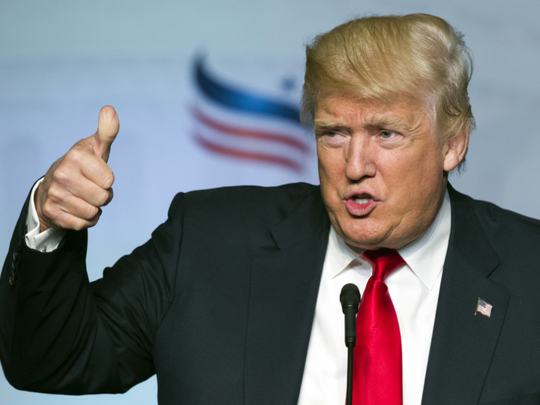
If you know how to read them, Federal Election Commission filings tell a story. Donald Trump’s most recent report, released last week, tells a rather sad one — of a campaign that falls far below basic standards of professional competence.
The most important number in the filing is $1,289,507.76 (Dh4.73 million). That’s the amount of cash the Trump campaign had on hand as of May 31, a grossly inadequate sum for the demands of a contemporary presidential campaign, which requires a large national staff, a sophisticated get-out-the-vote operation and lots of television advertising. It wouldn’t even be enough for a good Senate campaign.
In contrast, Hillary Clinton’s campaign had more than $42 million in cash on hand and raised $16 million more than Trump in May alone.
As if Trump’s money problems weren’t bad enough, he’s also spending the little he has unwisely. Upward of 20 per cent of his campaign spending is being funneled to various Trump properties as rent or expenses. Presumably in lieu of television advertising, Trump spent more than $200,000 on hats. And while Clinton has a staff of 700 people, Trump has just a tenth of that.
Money isn’t everything, but an advantage that big is hard to overcome. Clinton already has begun to advertise heavily in battleground states in which Trump isn’t running ads at all. And by acting early, the Hillary campaign is locking in advertising at favourable rates, so even when Trump does begin to buy air time, he’ll get less bang for his buck.
Given his massive financial disadvantages, to have any chance at all Trump would need to spend with a laser-like focus on a few swing states. Instead, his campaign has decided to spend some of its very scarce resources trying to win New York, a deeply blue state that Obama carried by 28 points in 2012 and 27 points in 2008. His New York strategy is being devised with Carl Paladino, a sort of dollar-store version of Trump who used a similar “say lots of outrageous things” approach in a 2010 gubernatorial race that he lost by nearly 30 points. Spending money and time trying to win New York would, in other words, be a really dumb idea even for a Republican flush with cash. For a Republican with as little money as Trump has, it’s a political death wish.
Can his campaign be turned around quickly? It’s not clear. Understandably but also disastrously for someone running for president, Trump hates fundraising.
His staff, moreover, is in flux. He fired campaign manager Corey Lewandowski on Monday, reportedly after Lewandowski suggested leaking Trump’s choice of vice president as a way to counteract declining poll numbers. The decision to fire his campaign manager was sound, if overdue, but I wouldn’t bet on his replacement faring much better.
The remarkable ineptitude that Trump’s Federal Election Commission (FEC) filings reveal is a particular problem for him as a Republican. The party has had its share of success, especially in low-turnout national midterm and state elections, but it is at a major disadvantage in presidential elections with higher turnout. The Democrats have won the popular vote in five of the last six presidential elections, and every year the changing demographics make the terrain more favourable for the Democrats (a trend Trump’s strategy of mobilizing white resentment will only accelerate.)
This doesn’t mean it’s impossible for Republicans to win the electoral college, but it does lower their margin for error. A campaign as poorly run as Trump’s makes what is already a steep hill to climb look like a mountain.
In general, political science research suggests that candidates and campaigns matter far less in determining presidential elections than factors such as the unemployment rate and the public’s approval of the incumbent. It’s not the horse race, it’s the economy, stupid. But this is true, in part, because major party candidates generally attain a certain basic level of competence and professionalism. Trump’s FEC filings show that he isn’t up to that level.
Current partisan configurations probably make an electoral college blowout like 1964 or 1972 impossible; Trump still will carry the deepest red states. But he may well be an anchor on his party comparable to Barry Goldwater or George McGovern and lose about as badly as it’s possible for a presidential candidate to lose in 2016.
— Los Angeles Times
Scott Lemieux is an associate professor of Political Science at the College of Saint Rose. He is a regular contributor to the Guardian, the American Prospect, the New Republic and the Week.












